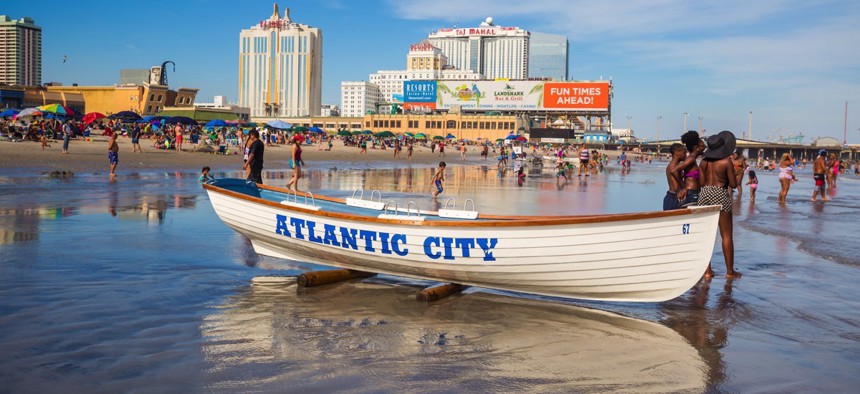Chris Christie vs. Atlantic City; Oklahoma Looks to Recoup Taxes on Out-of-State Sales

Atlantic City, New Jersey
Also in our State and Local Daily Digest: Indiana’s transparency battle legal fees; synthetic herbicide and pesticide ban; Seattle’s frozen crab highway spill
ATLANTIC CITY, NEW JERSEY
STATE AND CITY RELATIONS | Gov. Chris Christie announced Monday that New Jersey will sue cash-strapped Atlantic City in order to prod the local government there to pay about $34 million in tax revenues owed to the city’s school district. Christie’s move marks the latest step in an ongoing drama over the gambling town’s finances. The governor is at odds with New Jersey Assembly Speaker Vincent Prieto over legislation that would allow for a state takeover of the city. Christie has framed the bill as the only viable way to restructure the Atlantic City’s finances. Prieto has said the takeover bill will allow the state to trample the collective bargaining rights of public workers. Mayor Don Guardian is also opposed to the state takeover plan. He had warned that non-essential city services could shut down for about three weeks beginning this Friday due to cash shortfalls. But he said Monday that a pending agreement with local public worker unions could keep city operations running. [Press of Atlantic City]
OKLAHOMA CITY, OKLAHOMA
TAXES | “You may owe Oklahoma use tax on purchases you made from us during the previous tax year.” So starts the letter or email state residents will receive from companies if Senate Bill 1301 passes and they purchased things like groceries out-of-state from large online retailers like Amazon. The state Tax Commission estimates only 4 percent of such purchases are reported by Oklahomans on their tax returns—a loss of about $150 million in revenue. Oklahoma’s House may want taxes collected at the time of sale, however. [The Oklahoman]
INDIANAPOLIS, INDIANA
TRANSPARENCY | In the past eight months, the state of Indiana has spent $160,000 on legal fees associated with attempts to keep certain House and Senate communications out of reach from the public. The Citizens Action Coalition, along with Common Cause Indiana and the Energy and Policy Institute sued the state to gain access to records related to communications between state Sen. Eric Koch and utilities on solar power legislation. State officials contend that the communication is protected by a legislative work product exemption. [The Journal Gazette]
SAN FRANCISCO, CALIFORNIA
BENEFITS | San Franciscans may want to start rethinking their family plans now that the city appears poised to become the nation’s first to require employers fully pay for employee bonding time with their babies. Some small business owners are none too pleased, arguing it puts them at a regional disadvantage. California currently covers 55 percent of a new parent’s salary for six weeks, and the Board of Supervisors legislation would make businesses with at least 20 employees cover the remaining 45 percent. [San Francisco Chronicle]
SPRINGFIELD, OREGON
HOMELESSNESS | Members of the City Council approved legislation on Monday that would add a new offense under the city code: Motorists who give money, food or property to pedestrians, including panhandlers, now face a $50 fine. Supporters of the measure say it’s designed with public safety in mind while opponents have blasted the move as cold hearted. [Register Guard]
ALBUQUERQUE, NEW MEXICO
PUBLIC TRANSIT | A bus-rapid transit project planned for Albuquerque’s heavily traveled Central Avenue corridor has attracted lawsuits in state and federal court from opponents who say the project violates the National Historic Preservation Act plus other federal and city laws. Central Avenue is part of historic Route 66, and the bus rapid transit corridor would have dedicated lanes and stations in the middle of the thoroughfare. [Albuquerque Journal]
SOUTH PORTLAND, MAINE
ENVIRONMENT | Members of the City Council on Monday gave initial approval to a plan that would ban the use of synthetic pesticides and herbicides on both city-controlled land and private property inside city limits. While the mayor has praised the move, some have questioned the measure saying that it would be difficult to enforce. [Portland Press Herald]
LONDONDERRY TOWNSHIP, PENNSYLVANIA
FLOODPLAIN MANAGEMENT | Recreational cabins on two islands in the Susquehanna River downstream from Harrisburg will be torn down in the coming years due to the Federal Emergency Management Agency declaring them out of compliance with federal floodplain management rules. FEMA officials had said that they could have made the township and residents ineligible for flood insurance. [PennLive.com]
ARLINGTON HEIGHTS, ILLINOIS
ANIMAL WELFARE | Village officials have OK’d new rules for pet shop owners that aim to ensure that animals sold at their businesses come from safe and reputable breeders. The new rules require that a disclosure be posted on or near the cage of a dog or cat that details, among other items, that animal’s inoculation and medical history and whether the breeder is licensed by the U.S. Department of Agriculture. The rules impact one pet store in the Chicago suburb, which says it already meets many of the new requirements. [Daily Herald]
SEATTLE, WASHINGTON
TRANSPORTATION | A truck carrying boxes of frozen crab tipped over on the Alaskan Way Viaduct in along Seattle’s downtown waterfront on Monday afternoon, closing the important highway artery for the evening commute and snarling traffic. Nobody was hurt in the incident except, perhaps shellfish lovers who had to endure seeing so much good crab go to waste. Last year, aging and seismically vulnerable double-decker viaduct was the scene of another massive seafood spill, though that incident involved fish. [KOMO-TV]
Michael Grass is Executive Editor at Government Executive's Route Fifty.
NEXT STORY: Enlisting Public Libraries to Help Fight Homelessness





